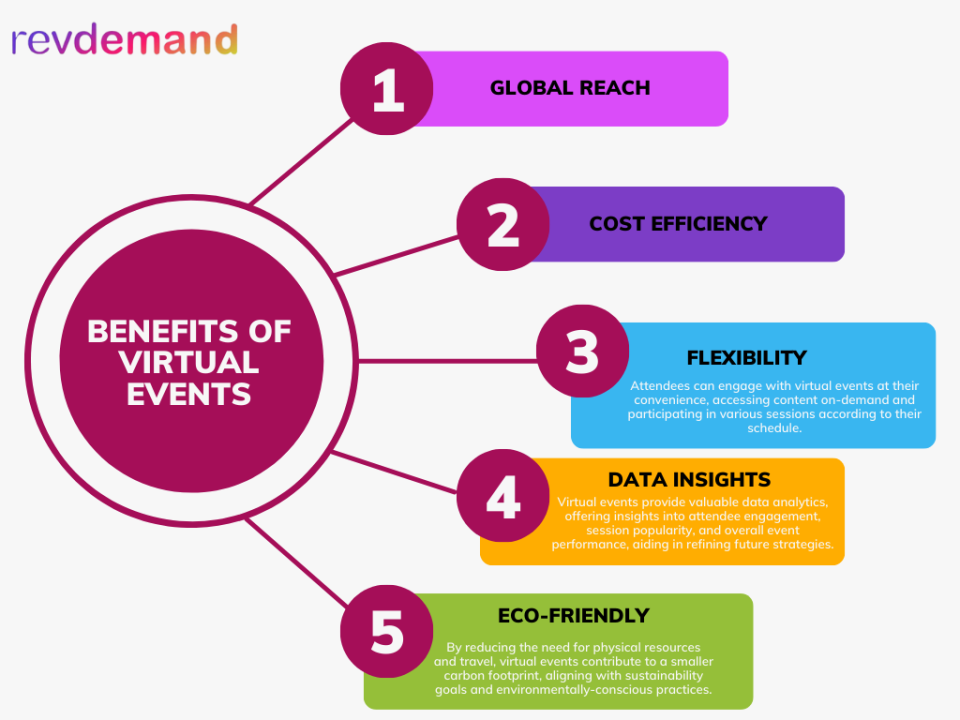Benefits Of Virtual Events
Virtual events offer numerous benefits, including cost-effectiveness, global reach, convenience, and scalability, making them a valuable alternative to traditional in-person events. By eliminating travel expenses and venue costs, virtual events allow businesses to significantly reduce overheads and allocate their budget more efficiently.
Moreover, virtual events can attract a global audience, allowing organizations to connect with participants from different geographical locations, resulting in increased brand exposure and networking opportunities. Additionally, attendees can conveniently participate in virtual events from their own homes or offices, eliminating the need for travel and accommodation arrangements.
Furthermore, virtual events can easily accommodate a large number of participants, making them scalable and flexible for businesses of all sizes. The benefits of virtual events are significant, making them a popular choice for organizations seeking effective ways to engage with their target audience.
Increased Accessibility
Virtual events offer increased accessibility by allowing participants to join from anywhere in the world, eliminating the need for travel and providing a convenient and inclusive platform for engagement.
Reaching A Global Audience
One of the key benefits of virtual events is the increased accessibility they offer. With traditional events, location can be a barrier for many individuals who are unable to attend due to distance or travel constraints. However, virtual events eliminate these limitations, allowing individuals from anywhere in the world to participate.
By taking your event online, you open up opportunities to reach a global audience. Whether your target market is in a different country, across the continent, or on the other side of the world, virtual events provide a platform for you to connect with individuals regardless of their geographic location.
This global reach brings countless advantages to your event. It enables you to tap into new markets, expand your customer base, and build relationships with individuals who may have previously been out of reach. By using virtual event technologies, you can bridge the geographical gap that may have hindered your event’s growth in the past.
No Geographic Constraints
The absence of geographic constraints is a gamechanger for both event organizers and attendees. With virtual events, participants no longer need to worry about the logistics and expenses associated with travel. This eliminates the need for costly flights, accommodation, and time away from home or work.
For event organizers, the lack of physical venue restrains brings immense flexibility. Without the need to secure a physical space, you no longer have to limit the number of attendees or worry about exceeding capacity. Virtual events can accommodate an unlimited number of participants, ensuring that no one is left out due to constraints on space.
The removal of geographic constraints also opens up opportunities for collaboration and networking. Individuals who would never have connected due to being in different regions or countries can now easily engage and share ideas. This interconnectedness fosters a global community and allows for the exchange of knowledge, insights, and experiences amongst individuals from diverse backgrounds and locations.
Cost Savings
One of the major advantages of virtual events is the significant cost savings they offer. By eliminating the need for physical venues and travel expenses, as well as reducing staffing and equipment costs, businesses can save a substantial amount of money. Let’s delve deeper into each of these cost-saving aspects:
No Venue Rental Or Travel Expenses
Organizing a traditional in-person event requires renting a venue, which can be quite expensive. In addition to the cost of renting the space, there are various expenses associated with maintaining the venue, such as utilities and custodial services. With virtual events, however, there is no need to worry about these costs at all.
Furthermore, virtual events eliminate the need for travel expenses. Attendees can participate from the comfort of their own homes or offices, eliminating the costs of transportation, accommodation, and meals. This allows companies to reach a wider audience without incurring substantial travel-related expenses.
Reduced Staffing And Equipment Costs
Another significant cost-saving aspect of virtual events is the reduction in staffing and equipment costs. Traditional events often require a large team to manage various tasks, such as event coordination, registration, and technical support. With virtual events, many of these tasks can be automated or streamlined, reducing the need for extensive staffing.
In addition, virtual events eliminate the need for expensive equipment. Physical events often require audiovisual equipment, staging setups, and specialized lighting. By opting for a virtual event, these equipment costs can be eliminated, saving businesses a substantial amount of money.
Overall, the cost savings offered by virtual events are undeniable. With no venue rental or travel expenses, as well as reduced staffing and equipment costs, businesses can allocate their resources more efficiently and achieve a higher return on investment. Embracing virtual events can be a smart financial decision for businesses of all sizes.
Flexibility And Convenience
Virtual events have revolutionized the way we connect and engage with others, offering remarkable flexibility and convenience. In today’s fast-paced world, where time and location constraints have become a common challenge, virtual events pave the way for a seamless experience. Let’s take a closer look at how virtual events provide flexibility and convenience, catering to the evolving needs of participants.
On-demand Content
One of the greatest advantages of virtual events is the availability of on-demand content. Unlike traditional in-person conferences or seminars, virtual events allow participants to access presentations, workshops, and sessions at their convenience. This means that attendees can revisit important content, catch up on missed sessions, or explore additional material long after the event has concluded.
Ability To Attend From Anywhere
Virtual events eliminate the need for travel and physical presence, enabling participants to attend from anywhere in the world. This flexibility opens up opportunities for individuals who may have otherwise been unable to attend due to geographical or logistical limitations. Whether in the comfort of their homes, offices, or while on the go, attendees can seamlessly connect, learn, and network with like-minded individuals effortlessly across borders.

Credit: www.finchmagician.com
Data And Analytics
Discover the advantages of virtual events through data and analytics. Uncover valuable insights and trends to enhance engagement, optimize content, and deliver a personalized attendee experience. Improve ROI and make data-driven decisions with the power of virtual event analytics.
Track Attendee Engagement
Gaining insights into attendee engagement is essential for the success of virtual events. With virtual events, you have the advantage of tracking attendee engagement in real-time. By using various data and analytics tools, you can monitor attendee interactions, such as how long they stay in a session, which sessions they attend, and the level of participation in Q&A sessions or polls. Tracking attendee engagement allows you to understand what aspects of your virtual event are resonating with your audience. This data can help you tailor future events to meet their preferences and expectations better. For example, if you notice a particular session has a high drop-off rate, you can investigate and make improvements, ensuring a more engaging experience for your attendees in the future.Measure Event Success
One of the most significant benefits of virtual events is the ability to measure their success through data and analytics. Traditional in-person events often rely on subjective feedback, making it challenging to quantify their impact. Virtual events, on the other hand, provide valuable data that gives you a clear understanding of your event’s success. You can measure the success of your virtual event by using key performance indicators (KPIs) such as attendance rate, session popularity, conversion rates, and engagement levels. By analyzing this data, you can determine which aspects of your event worked well and identify areas for improvement. This quantitative information is invaluable in demonstrating the return on investment (ROI) to stakeholders and refining your event strategies for future endeavors. To effectively measure event success, it is crucial to leverage data and analytics tools that provide comprehensive insights into attendee behavior and preferences. These tools can help you identify patterns and trends that impact the success of your virtual event. In conclusion, data and analytics play a pivotal role in the success of virtual events. By tracking attendee engagement and measuring event success, you can make data-driven decisions, improve the attendee experience, and ensure future virtual events are even more impactful.Reduced Environmental Impact
Virtual events offer the benefit of reduced environmental impact, as they eliminate the need for travel, reducing carbon emissions and waste. This eco-friendly approach contributes to a more sustainable future.
Less Energy Consumption
Virtual events have the distinct advantage of requiring significantly less energy consumption compared to traditional in-person events. Without the need for physical venues, travel, and equipment, the energy demand is drastically reduced. This not only leads to cost savings but also contributes to a more sustainable approach to event planning.
Reduced Carbon Footprint
A virtual event can greatly reduce the carbon footprint associated with traditional events. By eliminating the need for attendees to travel long distances, whether by car or plane, the emissions generated from transportation are significantly reduced. This reduction in carbon emissions plays a crucial role in combating climate change and promoting a greener, healthier planet.
Lowered Waste Production
Virtual events also contribute to reduced waste production. In traditional events, there is often a significant amount of waste generated, including paper-based materials such as brochures, flyers, and event programs. By moving to a virtual platform, these materials can be replaced with digital alternatives, eliminating the need for printing and reducing the overall waste generated.
Conservation Of Natural Resources
By opting for virtual events, natural resources are conserved. The materials typically used for physical events, such as wood, metals, and plastics, are no longer necessary, reducing the demand for these resources. This conservation helps protect natural ecosystems and promotes a sustainable approach to event planning.
Increased Accessibility And Inclusivity
Virtual events also promote increased accessibility and inclusivity. By removing the physical barriers associated with in-person events, individuals with mobility limitations or geographical constraints can easily participate. This expands the reach of events and ensures that a wider audience can benefit from the knowledge and connections shared in the virtual space.
Limited Noise And Light Pollution
Virtual events help mitigate noise and light pollution. In physical events, loud sounds and bright lights are often necessary to create a vibrant atmosphere. However, these can have negative impacts on the surrounding environment. With virtual events, attendees can participate from the comfort of their own spaces, reducing the need for excessive noise and lights that can disturb local ecosystems and communities.
Flexible And Sustainable Event Planning
Virtual events offer a more flexible and sustainable approach to event planning. Without the constraints of physical venues and logistical challenges, event organizers have the freedom to design events that are environmentally friendly and easily customizable. This flexibility allows for greater creativity and innovation while ensuring a reduced impact on the environment.
Opting for virtual events can lead to significant cost savings for both organizers and participants alike. Without the need for venue rentals, travel expenses, accommodation, and catering, the overall cost of organizing and attending events is significantly reduced. This cost-effectiveness makes virtual events an attractive option for organizations looking to stay within budget while still providing valuable experiences for participants.

Credit: c-mric.org

Credit: www.leadinglearning.com
Frequently Asked Questions For Benefits Of Virtual Events
How To Choose The Right Virtual Event Platform?
To choose the right virtual event platform, consider your goals, features offered, pricing, and customer reviews.
What Are The Key Advantages Of Virtual Events?
Virtual events offer cost savings, global reach, and data insights, making them convenient and effective for networking, education, and brand awareness.
How Can Virtual Events Enhance Audience Engagement?
Virtual events enhance audience engagement through interactive features like live Q&A sessions, polls, gamification, and networking opportunities, fostering meaningful connections.
Conclusion
Virtual events have revolutionized the way we connect and interact in the digital age. With their numerous benefits, including cost efficiency, global accessibility, and ease of organization, virtual events are becoming increasingly popular. From expanding audience reach to reducing carbon footprint, virtual events offer a range of advantages for businesses and participants alike.
As technology continues to advance, embracing virtual events can open up endless possibilities for networking, learning, and collaboration. So why wait? Start harnessing the power of virtual events today and unlock a world of opportunities.




